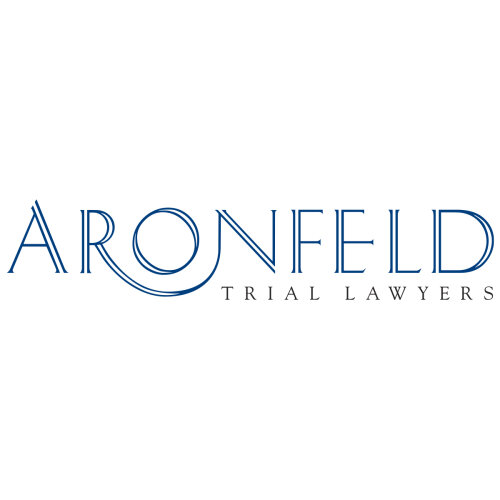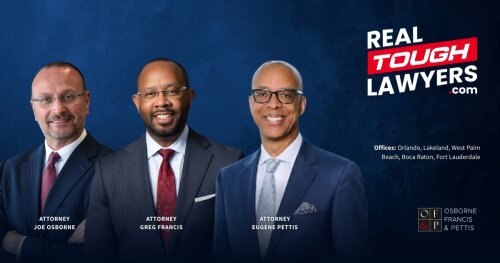Best State, Local, and Municipal Law Lawyers in Florida
Share your needs with us, get contacted by law firms.
Free. Takes 2 min.
Or refine your search by selecting a city:
List of the best lawyers in Florida, United States
About State, Local, and Municipal Law in Florida, United States
State, Local, and Municipal Law in Florida refers to the body of laws and regulations that govern the relationship between individuals, businesses, and various government entities within the state. While state law is created and enforced at the state level, local and municipal laws are established by counties, cities, and towns to address matters specific to those communities. These laws cover a wide range of issues such as zoning, land use, public safety, licensing, taxation, environmental regulation, and more. Understanding the complex interactions between state statutes and local ordinances is vital for residents, business owners, and government officials alike.
Why You May Need a Lawyer
Legal matters involving state, local, and municipal law can be complex and often involve unique local requirements or procedures. You may need a lawyer if you are:
- Facing a dispute over zoning, property use, or land development
- Challenging or seeking a variance from a local ordinance
- Responding to a code enforcement action or citation
- Applying for or renewing business permits and licenses
- Involved in disputes with city or county authorities
- Dealing with issues related to local taxes or assessments
- Seeking access to public records or attending government meetings
- Experiencing eminent domain, annexation, or property condemnation
- Navigating environmental or land conservation regulations
- Engaged in collective bargaining or civil service issues as a public employee
Having legal representation can help ensure your rights are protected and all legal requirements are properly addressed.
Local Laws Overview
Local laws in Florida are enacted by city and county governments to address the specific needs of their communities. Common areas regulated by local and municipal law include:
- Zoning and Land Use: Determines how property can be used, including rules for residential, commercial, and industrial areas.
- Building Codes: Sets standards for construction, renovations, and safety requirements for buildings and structures.
- Code Enforcement: Local authorities enforce compliance with ordinances regarding property maintenance, noise, signage, and more.
- Licensing and Permits: Businesses and residents may need permits or licenses for activities such as operating a business, hosting events, or building projects.
- Local Taxes and Fees: Cities and counties can levy local taxes, such as property taxes, sales taxes, and special assessments for services.
- Environmental Regulations: Rules concerning water use, waste management, and land preservation may be stricter at the local level.
- Public Safety: Local laws cover issues like curfews, parking restrictions, and emergency management.
- Public Meetings and Records: Florida’s “Sunshine Law” requires many government meetings to be open and public records to be accessible.
Failure to comply with local laws can result in fines, legal action, or the loss of permits and licenses, making it crucial to stay informed about the rules that apply in your area.
Frequently Asked Questions
What is the difference between state, local, and municipal law?
State law is enacted by the Florida Legislature and applies throughout Florida. Local and municipal law is made by counties, cities, and towns to address localized concerns and only applies within those jurisdictions.
How do I find out what local laws apply to my property or business?
You can check your city or county’s official website, contact the local clerk’s office, or consult with a lawyer familiar with the local ordinances that affect your situation.
Can local ordinances override state laws?
Local ordinances cannot conflict with state law. If a local law contradicts a state statute, the state law generally prevails. However, local governments can pass more restrictive regulations where allowed.
What should I do if I receive a code enforcement notice?
Carefully read the notice, note any deadlines for response or correction, and consider consulting a lawyer to discuss your options and rights before responding.
Do I need a permit to make improvements on my home or property?
Most types of construction, renovation, or certain home improvements require a permit from your local building department. Always check your city or county regulations before starting any work.
How can I challenge a zoning decision or variance denial?
You typically have the right to appeal a zoning decision to a local board or circuit court. A lawyer can help you understand the appeal process and represent your interests.
What are my rights to attend government meetings or obtain public records?
Florida’s Sunshine Law provides broad rights to attend government meetings and inspect public records, with some exceptions for sensitive or confidential information.
Who enforces local ordinances in Florida?
Code enforcement officers, local police, and various city or county departments are responsible for enforcing local laws. Administrative boards may also oversee specific compliance issues.
Are there penalties for not following local laws?
Penalties can include fines, citations, legal action, or revocation of permits and licenses. Persistent violations may result in more serious consequences, such as court orders or liens.
How can I get involved in changing local laws or ordinances?
You can attend public meetings, provide input during hearings, contact your local elected officials, or participate in advisory boards and committees in your community.
Additional Resources
For more information and assistance, consider the following resources in Florida:
- Florida Department of State - Division of Elections and Local Government
- Florida League of Cities
- Florida Association of Counties
- Local city or county clerk’s offices
- Florida Bar Association - Section on City, County and Local Government Law
- Your local public library’s legal resources section
- Legal aid organizations offering assistance with public benefits, housing, or municipal disputes
Next Steps
If you believe you need legal assistance involving state, local, or municipal law in Florida, take the following steps:
- Identify the specific issue or legal question you have, and gather any relevant documents or notices.
- Contact your local city or county offices to learn about available procedures and resources.
- Consult with a lawyer who specializes in Florida state, local, and municipal law to get personalized legal advice and representation if needed.
- Attend public meetings or hearings as required, and be prepared to present your case or concerns in accordance with local procedures.
- Keep thorough records of all interactions and correspondence related to your issue.
While many issues can be resolved at the local level, professional legal guidance is often essential for navigating the complexities of state and municipal regulations in Florida. If in doubt, do not hesitate to seek qualified legal assistance.
Lawzana helps you find the best lawyers and law firms in Florida through a curated and pre-screened list of qualified legal professionals. Our platform offers rankings and detailed profiles of attorneys and law firms, allowing you to compare based on practice areas, including State, Local, and Municipal Law, experience, and client feedback.
Each profile includes a description of the firm's areas of practice, client reviews, team members and partners, year of establishment, spoken languages, office locations, contact information, social media presence, and any published articles or resources. Most firms on our platform speak English and are experienced in both local and international legal matters.
Get a quote from top-rated law firms in Florida, United States — quickly, securely, and without unnecessary hassle.
Disclaimer:
The information provided on this page is for general informational purposes only and does not constitute legal advice. While we strive to ensure the accuracy and relevance of the content, legal information may change over time, and interpretations of the law can vary. You should always consult with a qualified legal professional for advice specific to your situation.
We disclaim all liability for actions taken or not taken based on the content of this page. If you believe any information is incorrect or outdated, please contact us, and we will review and update it where appropriate.
Browse state, local, and municipal law law firms by city in Florida
Refine your search by selecting a city.











